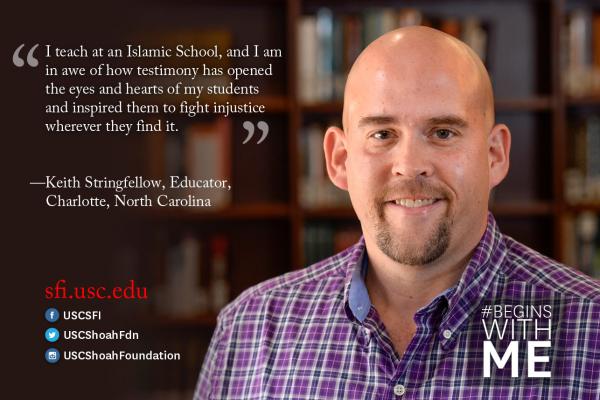#BeginsWithMe: How Testimony Impacts My Students
I teach at an Islamic school, and I am in awe of how testimony has opened the eyes and hearts of my students and inspired them to fight injustice. This is particularly amazing considering the Shoah is not even part of the curriculum in many Arab countries.
When I asked my class why testimony has affected them so deeply, their response was:
“Testimony teaches us that the world isn’t about us vs. them. It is about how WE can make the world a better place by not being bystanders.”

“Did this type of thing happen in Germany during the Shoah?” “What makes people think it is OK to mistreat their neighbors in an educated country?” “Why do people hate us because of our religion?” “Was 9/11 the Reichstag Fire for the United States?” “Will Muslims have a Kristallnacht in America?”
In January, I traveled with USC Shoah Foundation to Poland as part of the Auschwitz: Past is Present Program. I never imagined in my wildest dreams the impact of Jewish Holocaust survivor testimony would have on my students. Even though Jews are culturally seen as the enemy by many historically Muslim countries, I discovered a previously unseen connection to my students that explained the connection between the past and the present.
I asked a former student what he thought about using testimony, and he pointed something out to me. He said, “Testimony reminds me of the Hadith or events recorded about our Prophet Muhammad (peace be unto him).” I asked him how that was a case. He said like so many other students that “we cannot be bystanders, and the testimonies are reminders of what we already know.” He then quoted to me a Hadith that I recite every time we use testimony to this day. “Whoever of you sees an evil must change it with his hand. If he is unable to do so, he must change it with his tongue. If he is unable to do so, he must change it with his heart, and that is the smallest example of faith.”
Testimony gives us the same advice, and this gives testimony a powerful connection to my Muslim students.